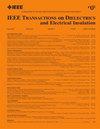基于压力优化的绝缘油改善聚丙烯/硅橡胶界面
IF 3.1
3区 工程技术
Q2 ENGINEERING, ELECTRICAL & ELECTRONIC
IEEE Transactions on Dielectrics and Electrical Insulation
Pub Date : 2025-01-15
DOI:10.1109/TDEI.2025.3530387
引用次数: 0
摘要
电缆附件绝缘系统不可避免地受到其界面状态的影响,导致绝缘失效。绝缘油常用于具有一定压力的界面,以提高其性能,但绝缘油中聚合物的失配和降解严重影响了界面的稳定性。本研究以聚丙烯(PP)绝缘为研究对象,旨在通过加压绝缘油改善其与硅橡胶(SIR)的典型附件界面。结果表明:烃类油对PP的负面影响最大,其质量增量最大,表面沉积较多,力学性能和电学性能均显著恶化;相反,适当吸收含硅油有助于改性PP的表面,填补PP的初始缺陷,提高其绝缘性能。此外,发现界面压力有助于制备具有优异绝缘性能的稳定PP/绝缘油/SIR结构。但是,过大的压力由于材料的界面变形而产生负面影响。通过对界面微观结构的分析和金属电极与聚合物的接触应力计算,揭示了聚合物、绝缘油和外界压力之间耦合作用的机理。对绝缘接口改进的研究可以为电缆绝缘的制造和优化提供关键的参考和依据。本文章由计算机程序翻译,如有差异,请以英文原文为准。
Improvement of Polypropylene/Silicone Rubber Interface by Insulating Oils With Pressure Optimization
Cable accessory insulation system is inevitably affected by its interface states causing insulation failure. Insulating oils are often applied in the interface with a certain pressure to improve its performance, but the mismatching and degradation of polymer in insulating oils seriously affect the interface stability. This study focuses on polypropylene (PP) insulation and aims to improve its typical accessory interface with silicone rubber (SIR) by insulating oils with pressure. Results show that hydrocarbon oil has the biggest negative impact on PP with the most mass increment, more surface deposits, and significant deteriorating in both mechanical and electrical properties. By contrast, appropriate absorption of Si-containing oil helps modify surface and fill initial defects of PP, promoting insulating performance. Furthermore, it is found that interface pressure is conductive to fabricate a stable PP/insulating oil/SIR structure with excellent insulating performance. However, excessive pressure causes a negative impact due to interface deformation of materials. Based on the analysis of interface microstructure and the calculation of contact stress between metal electrode and polymer, the mechanism of coupling interaction among polymer, insulating oil, and external pressure is revealed. This research on the improvement of insulation interface can provide a key reference and basis for the manufacturing and optimizing of cable insulation.
求助全文
通过发布文献求助,成功后即可免费获取论文全文。
去求助
来源期刊
CiteScore
6.00
自引率
22.60%
发文量
309
审稿时长
5.2 months
期刊介绍:
Topics that are concerned with dielectric phenomena and measurements, with development and characterization of gaseous, vacuum, liquid and solid electrical insulating materials and systems; and with utilization of these materials in circuits and systems under condition of use.

 求助内容:
求助内容: 应助结果提醒方式:
应助结果提醒方式:


